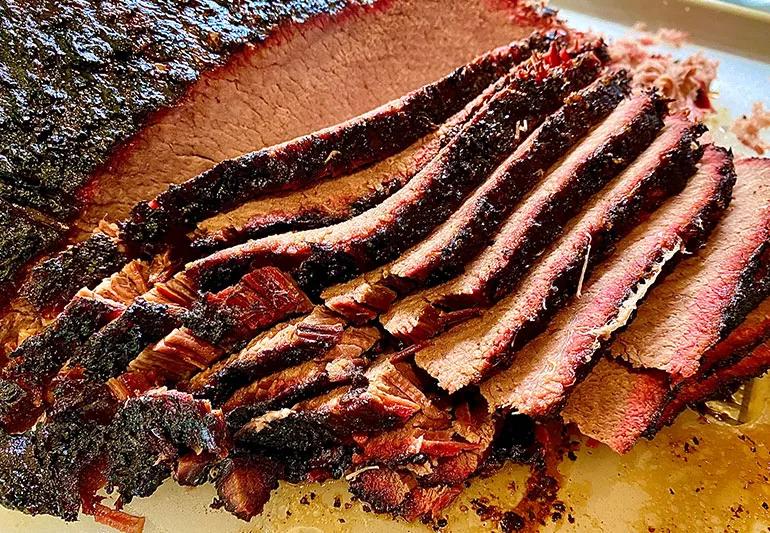They’re classified as carcinogenic because of their link to cancer

Image content: This image is available to view online.
View image online (https://assets.clevelandclinic.org/transform/82f0b59a-1d7a-4dca-99d4-e73d7367881f/SmokedMeats-1271137628-770x533-1_jpg)
Smoked roast beef is sliced on a cutting board.
There’s nothing like the smell of smoked meats in the summer. If you’ve ever stepped outside and breathed in the aroma of a neighbor firing up the wood smoker, you know how mouth-watering the simple thought of such a meal can be — not to mention the taste.
Advertisement
Cleveland Clinic is a non-profit academic medical center. Advertising on our site helps support our mission. We do not endorse non-Cleveland Clinic products or services. Policy
But back away from the brisket and put down the pork butt, as there are some serious health concerns you should know about before planning your next feast.
Registered dietitian Gillian Culbertson, RD, LD, gets to the meat of the issue.
In short, smoked meat is contaminated meat.
When you hear the term “contaminated food,” you might imagine clear signs of nastiness, like a bad taste, a foul odor or a weird color. But here’s the trouble with smoked meats: The same process that makes them taste so good also contaminates them.
“The smoke itself is a source of contaminants that can be harmful,” Culbertson explains. Harmful substances called polycyclic aromatic hydrocarbons (PAHs) and heterocyclic amines (HCAs) form when meat is cooked at very high temperatures.
Though grilled and pan-fried meats can also lead to the formation of PAHs and HCAs, studies show that smoking leads to higher levels of contamination. During the smoking process, the smoke both creates these substances and carries them onto the surface of the meat.
“These compounds are created when fluids and fat drip from the meat onto the heat source and as a byproduct of the smoke,” Culbertson says. “Aromatic rings are formed, creating these harmful compounds that are transported to the meat from the smoke.”
Advertisement
The National Cancer Institute warns that both HCAs and PAHs are mutagenic, meaning they can cause changes to your DNA that put you at risk for certain types of cancer.
“High exposure to these compounds can lead to increased risk of cancer of the intestinal tract, notably colon and stomach cancer,” Culbertson says. “Some recent research also suggests that red and processed meats, including smoked meats, may increase your risk of breast and prostate cancer.”
In fact, the World Health Organization (WHO) has classified processed meat — which includes smoked meat — as a Group 1 carcinogenic based on evidence of its link to colorectal cancer. Red meat, they say, is “probably carcinogenic to humans.” (Remember, not all processed meat is red meat, and not all red meat is processed. But there can be overlap, as in the case of, say, smoked beef brisket.)
Smoked, processed meats and red meats have been associated with a higher risk of a variety of health conditions, including:
“Currently, there are no federal guidelines addressing the amount of foods that contain PAHs and HCAs that are thought to be safe,” Culbertson says.
In general, though, the American Cancer Society recommends consuming red and processed meats rarely, if at all. And the Mediterranean Diet, thought to be one of the heart-healthiest diets out there, allows for no more than one serving of red meat per week.
Bad news: It’s not just meat. Smoked cheeses have been found to contain those harmful PAHs, too. “Testing has found PAH in the interior of the cheese, but it’s concentrated in the rind,” Culbertson says.
That’s not to say you can never enjoy a smoked Gouda or gruyère again. But keep your processed cheese intake to a minimum, and cut off that rind before you dig in.
The science is clear: Smoked meat should be a very occasional indulgence, if at all. Culbertson shares a few tips for making the healthiest choices possible for those times when you can’t resist the siren song of the smoker.
Advertisement

Sign up for our Health Essentials emails for expert guidance on nutrition, fitness, sleep, skin care and more.
Learn more about our editorial process.
Advertisement
This color additive, found in many pre-packaged foods, may affect people with ADHD or allergies
With a focus on internal cues for hunger and fullness, this eating style may revolutionize your relationship with food
Review the ingredients, watch for sugar and fat, and choose one with the right amount of protein for your needs
Getting the hang of portions can help you better understand how much to put on your plate
A typical recommended balanced diet is half fruits and veggies, a quarter protein and a quarter grains
Foods high in protein, fiber and water can help keep hunger at bay
This quirky food trend is harmless, as long as you’re getting enough protein, fiber and healthy fats
With a little planning, you can fill your belly and boost your energy
Although it could be used as a moisturizer, this new trend is not recommended
Communicating clear limits helps protect your time, energy and emotional well-being
High cholesterol can be genetic, but testing and treatment can lower your heart disease risk